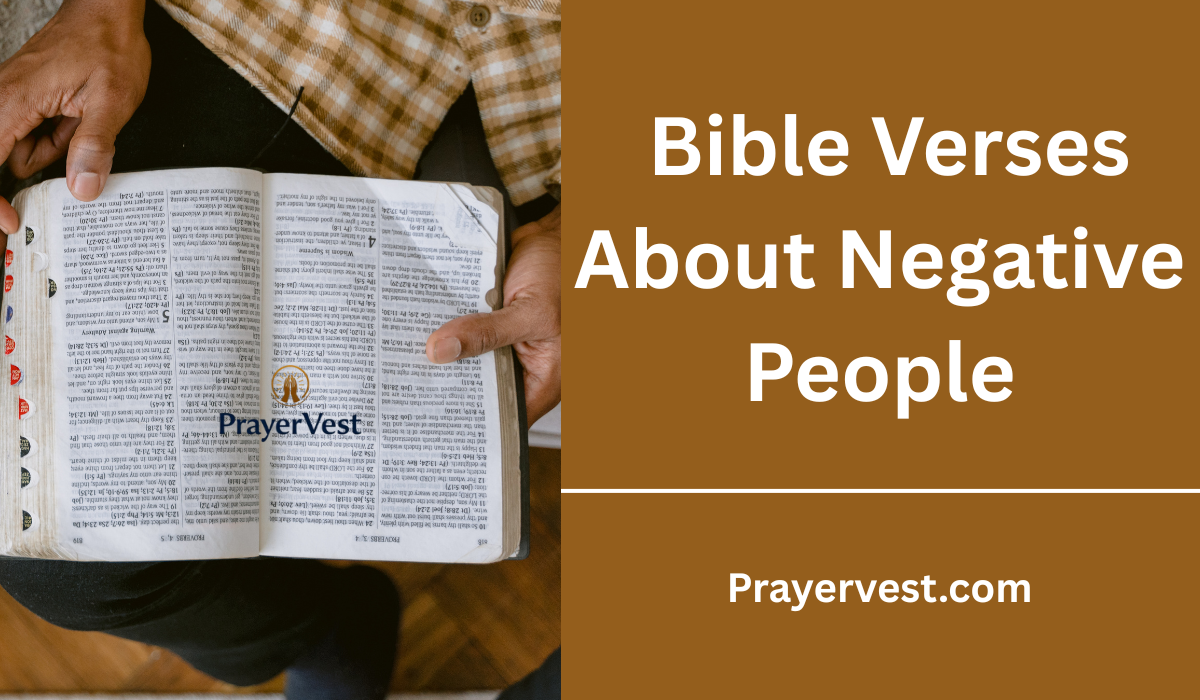One of the hardest things in life can be dealing with negative individuals. Their behavior, words, and attitudes frequently cause anxiety, conflict, or discouragement, which affects our mental and spiritual health.
The Bible provides timeless advice on how to handle negativity, including tactics for navigating relationships with those who might sow strife or criticism, as well as wisdom and encouragement. These verses remind us that although we can’t always control other people’s actions, we can manage how we react and keep our hearts in line with God’s truth.
The Bible gives us helpful guidance for protecting our hearts and fostering peace by presenting negative people in a variety of ways, including gossipers, whiners, critics, and those who sow dissension.
We learn the value of patience, discernment, and humility while dealing with challenging people from Proverbs, Psalms, and the teachings of Jesus and the apostles. These verses highlight self-control, sage advice, and the effectiveness of prayer, demonstrating how God’s direction may turn difficult relationships into chances for spiritual development and personal improvement.


Examining Bible passages regarding negative individuals gives believers the perspective and skills they need to deal with poisonous influences in a way that is godly. They inspire us to uphold our moral character, react with compassion instead of hatred, and look for heavenly guidance in every encounter. By putting these ideas into practice, we may safeguard our hearts, forge closer bonds with others, and foster peaceful, supportive settings even when there is negativity around. These texts provide as a road map, assisting us in navigating the intricacies of human nature while staying firmly anchored in our faith and directed by the word of God.
40 Uplifting Bible Verses About Negative People (2026)
1. Proverbs 22:24-25
“Do not make friends with a hot-tempered person, do not associate with one easily angered, or you may learn their ways and get yourself ensnared.”
This passage warns about the influence of negative or angry people on our character and behavior. Associating closely with those who harbor negativity, bitterness, or uncontrolled anger can subtly shape our own attitudes and decisions. The verse reminds us to be discerning in our relationships, understanding that our companions can either build us up or lead us into destructive patterns. Guarding our hearts from toxic influences is essential for maintaining emotional, spiritual, and relational health.
2. Psalm 1:1
“Blessed is the one who does not walk in step with the wicked or stand in the way that sinners take or sit in the company of mockers.”
Psalm 1 emphasizes the blessings of avoiding negative influences. Those who distance themselves from mockers, critics, and harmful company are likened to trees planted by streams of water, flourishing and bearing fruit. The verse teaches that our environment and associations greatly impact our spiritual growth and personal success. Choosing to steer clear of negativity allows us to stay rooted in wisdom, righteousness, and God’s favor.
3. 1 Corinthians 15:33
“Do not be misled: ‘Bad company corrupts good character.’”
The Apostle Paul directly addresses the danger of negative influences, cautioning that even morally upright individuals can be swayed by harmful associations. This verse underscores the importance of intentionality in choosing friends, mentors, and companions. Negative people—through constant criticism, cynicism, or destructive behaviors—can erode one’s values, faith, and character. Being mindful of company is essential for preserving integrity and living a life aligned with God’s principles.
4. Proverbs 13:20
“Walk with the wise and become wise, for a companion of fools suffers harm.”
Proverbs 13:20 reinforces the impact of our associations. While negative people can lead us into foolishness and harm, surrounding ourselves with wise, encouraging individuals fosters growth, understanding, and discernment. This verse teaches that wisdom is not only a personal pursuit but also relationally influenced. Choosing companions carefully protects our minds and hearts from toxicity and guides us toward godly living.
5. Galatians 6:7-8
“Do not be deceived: God cannot be mocked. A man reaps what he sows. Whoever sows to please their flesh, from the flesh will reap destruction; whoever sows to please the Spirit, from the Spirit will reap eternal life.”
This passage reminds us that exposure to negative people can subtly influence our thoughts, actions, and spiritual outcomes. Associating with those who dwell in cynicism, selfishness, or destructive habits can lead us to reap consequences that hinder our growth and fulfillment. Conversely, sowing relationships with uplifting and godly individuals produces spiritual fruit and lasting blessings. The verse highlights the long-term impact of our social environment on both character and destiny.
6. Proverbs 14:7
“Stay away from a fool, for you will not find knowledge on their lips.”
This verse highlights the futility of engaging with negative or foolish people who do not seek wisdom. Negative individuals often speak discouraging, harmful, or misleading words, which can hinder your personal and spiritual growth. By choosing to distance ourselves from such influences, we create space for learning, understanding, and nurturing relationships that encourage godly character.
7. Proverbs 21:9
“Better to live on a corner of the roof than share a house with a quarrelsome wife.”
Though this proverb specifically mentions a quarrelsome wife, it extends to any negative person whose constant conflict and criticism create a toxic environment. The verse emphasizes the importance of peace and harmony in one’s surroundings and serves as a caution against enduring persistent negativity that disrupts personal well-being.
8. Psalm 37:1
“Do not fret because of those who are evil or be envious of those who do wrong.”
Psalm 37 teaches that negative people should not provoke worry or envy in our hearts. Dwelling on their actions can lead to frustration, bitterness, and misplaced focus. Instead, we are encouraged to trust in God’s justice, remain steadfast in our faith, and maintain a positive outlook regardless of the negativity around us.
9. Proverbs 17:27-28
“The one who has knowledge uses words with restraint, and whoever has understanding is even-tempered. Even fools are thought wise if they keep silent, and discerning if they hold their tongues.”
This passage emphasizes the value of restraint when dealing with negative people. Silence and discretion can prevent unnecessary conflicts and protect your character from being influenced by folly. Responding with wisdom rather than reacting impulsively helps maintain peace and ensures that negativity does not spread.
10. Matthew 5:44
“But I tell you, love your enemies and pray for those who persecute you.”
Even when faced with negative people, Jesus calls us to respond with love, compassion, and prayer. This verse reminds us that negativity is best countered not with hostility but with a heart guided by God. By choosing prayer and love, we can neutralize the harmful effects of negativity while reflecting Christ’s character to those around us.
11. Proverbs 16:28
“A perverse person stirs up conflict, and a gossip separates close friends.”
This verse warns about negative individuals who create division through harmful words and actions. Gossip and manipulation can erode trust, damage relationships, and cause unnecessary strife. By recognizing these traits, we can avoid toxic interactions and protect the unity and peace of our friendships and families.
12. Romans 12:18
“If it is possible, as far as it depends on you, live at peace with everyone.”
While some negative people may try to provoke or discourage us, this verse encourages a proactive approach to maintaining peace. It reminds us that we cannot control others’ behavior, but we can control our responses, fostering harmony and avoiding unnecessary conflict.
13. Proverbs 12:26
“The righteous choose their friends carefully, but the way of the wicked leads them astray.”
This passage emphasizes the importance of discernment in relationships. Choosing friends wisely shields us from negative influences that can lead us away from righteousness and godly living. Surrounding ourselves with positive, faith-filled people nurtures growth and strengthens our character.
14. James 4:11
“Do not speak against one another, brothers and sisters. Anyone who speaks against a brother or sister or judges them speaks against the law and judges it.”
This verse highlights the danger of engaging with negative people who criticize or judge others. Joining in negativity spreads harm and undermines the community. Instead, we are called to respond with understanding, restraint, and love, fostering unity rather than division.
15. Proverbs 15:1
“A gentle answer turns away wrath, but a harsh word stirs up anger.”
Proverbs 15:1 teaches us how to handle negative people effectively. Responding with calmness and gentleness diffuses tension and prevents escalation. This approach protects our peace while modeling Christlike behavior, demonstrating that positivity can neutralize negativity.
16. Ecclesiastes 4:13
“Better a poor but wise youth than an old but foolish king who no longer knows how to heed a warning.”
Even those in positions of authority can exhibit negative traits such as stubbornness or ignorance. This verse reminds us that wisdom, discernment, and humility outweigh status or experience. Avoiding negative influences, even from authority figures, safeguards our personal and spiritual growth.
17. Proverbs 19:13
“A foolish child is a father’s ruin, and a quarrelsome wife is like a constant dripping.”
This proverb highlights how negative attitudes and persistent quarrels can erode relationships over time. Whether within family or social circles, constant negativity wears down patience, joy, and stability. Recognizing these behaviors allows us to maintain healthy boundaries and protect our well-being.
18. 1 Peter 3:9
“Do not repay evil with evil or insult with insult. On the contrary, repay evil with blessing, because to this you were called so that you may inherit a blessing.”
Peter teaches that negative people should not provoke retaliation or bitterness. Instead, responding with blessings and kindness transforms difficult interactions and aligns our behavior with God’s will. This verse encourages spiritual maturity and emotional resilience.
19. Proverbs 29:11
“Fools give full vent to their rage, but the wise bring calm in the end.”
Negative individuals often act impulsively and react with anger. This verse reminds us that responding with patience, wisdom, and composure helps us maintain peace and prevents us from being dragged into destructive conflict. Choosing calm over reaction preserves both relationships and personal integrity.
20. Philippians 4:8
“Finally, brothers and sisters, whatever is true, whatever is noble, whatever is right, whatever is pure, whatever is lovely, whatever is admirable—if anything is excellent or praiseworthy—think about such things.”
Philippians 4:8 provides a practical antidote to negativity. By focusing our minds on positive, virtuous, and uplifting thoughts, we protect ourselves from the harmful influence of negative people. Cultivating a mindset rooted in God’s truth empowers us to maintain peace, joy, and clarity in all circumstances.
21. Proverbs 26:20
“Without wood a fire goes out; without a gossip a quarrel dies down.”
This verse illustrates how negative people, especially those who spread gossip, fuel conflict and division. Removing or limiting exposure to such individuals can prevent disputes from escalating. It teaches that avoiding engagement with harmful speech promotes peace and allows relationships to remain intact.
22. Matthew 7:6
“Do not give dogs what is sacred; do not throw your pearls to pigs. If you do, they may trample them under their feet, and turn and tear you to pieces.”
Jesus warns against sharing valuable truths with those who reject or mock them. Negative people often dismiss wisdom and respond destructively. This verse encourages discernment, teaching us to protect our spiritual and emotional investments from those who will not appreciate or honor them.
23. 2 Timothy 3:1-5
“But mark this: There will be terrible times in the last days. People will be lovers of themselves, lovers of money, boastful, proud, abusive, disobedient to their parents, ungrateful, unholy, without love, unforgiving, slanderous, without self-control, brutal, not lovers of the good, treacherous, rash, conceited, lovers of pleasure rather than lovers of God—having a form of godliness but denying its power. Have nothing to do with such people.”
Paul’s description of negative people provides a clear warning: some behaviors are spiritually destructive and incompatible with godly living. We are instructed to avoid close association with such individuals to safeguard our faith, values, and character. This passage stresses the importance of vigilance in selecting companions.
24. Proverbs 25:17
“Seldom set foot in your neighbor’s house—too much of you, and they will hate you.”
Excessive exposure to negative or critical people can strain relationships and generate resentment. This proverb emphasizes boundaries, reminding us that even a well-meaning presence can become burdensome if not measured. Setting healthy limits helps maintain harmony and protects our emotional well-being.
25. Romans 16:17
“I urge you, brothers and sisters, to watch out for those who cause divisions and put obstacles in your way that are contrary to the teaching you have learned. Keep away from them.”
Paul encourages believers to identify and distance themselves from divisive or obstructive individuals. Negative people can derail spiritual growth and create unnecessary conflict. This verse highlights the importance of vigilance and discernment in protecting ourselves from harmful influences.
26. Proverbs 24:1-2
“Do not envy the wicked, do not desire their company; for their hearts plot violence, and their lips talk about trouble.”
Negative people often harbor harmful intentions and speak destruction. These verses advise against seeking their friendship or approval. Instead, focusing on godly associations preserves integrity and aligns us with righteousness, steering us away from conflict and deceit.
27. 1 Corinthians 15:33
“Do not be misled: ‘Bad company corrupts good character.’”
This verse reinforces a recurring biblical principle: the company we keep profoundly affects our morals and behavior. Negative people can erode our character, attitudes, and spiritual focus. Choosing positive, faith-filled companions is essential for living a life consistent with God’s will.
28. James 1:19
“My dear brothers and sisters, take note of this: Everyone should be quick to listen, slow to speak and slow to become angry.”
Dealing with negative people requires patience, restraint, and wisdom. James advises a careful approach to communication, teaching that controlling our responses prevents escalation and protects our own hearts from the harmful effects of negativity.
29. Proverbs 11:14
“For lack of guidance a nation falls, but victory is won through many advisers.”
This verse reminds us that seeking counsel from positive, wise, and godly individuals prevents the influence of negative people from causing harm. Choosing the right circle of advisers and companions strengthens decision-making and shields us from destructive paths.
30. Colossians 3:8
“But now you must also rid yourselves of all such things as these: anger, rage, malice, slander, and filthy language from your lips.”
Colossians calls us to eliminate negativity from our own behavior while interacting with others. Negative people often reflect these harmful traits, and by removing them from our influence and guarding our speech, we maintain purity, peace, and godliness in our lives.
31. Proverbs 4:14-15
“Do not set foot on the path of the wicked or walk in the way of evildoers. Avoid it, do not travel on it; turn from it and go on your way.”
These verses emphasize the importance of avoiding negative people and their harmful paths. Following or being influenced by the wicked can lead to moral compromise and spiritual stagnation. Choosing to walk in wisdom and righteousness protects our integrity and aligns our lives with God’s purposes.
32. Psalm 34:14
“Turn from evil and do good; seek peace and pursue it.”
Psalm 34 encourages proactive action against negativity. Instead of dwelling on the harmful behavior of others, we are called to focus on goodness and pursue peace. This approach not only shields us from negative influences but also promotes positive relationships and spiritual well-being.
33. Proverbs 14:16
“The wise fear the Lord and shun evil, but a fool is hotheaded and yet feels secure.”
Negative people often act impulsively and without regard for consequences. This verse contrasts wisdom with foolishness, teaching that avoiding such individuals protects our own peace and ensures that we remain guided by reverence for God rather than being swept into chaos.
34. 2 Corinthians 6:14
“Do not be yoked together with unbelievers. For what do righteousness and wickedness have in common? Or what fellowship can light have with darkness?”
Paul’s teaching reminds us that close association with negative or ungodly people can undermine faith and values. Spiritual compatibility and integrity are crucial in relationships. Avoiding partnerships that compromise righteousness preserves our spiritual strength and clarity.
35. Proverbs 29:12
“If a ruler pays attention to lies, all his officials become wicked.”
This verse warns about the cascading influence of negative people. Leadership and authority can be corrupted when influenced by deception or harmful counsel. Recognizing and distancing from negative influencers prevents the spread of toxicity in any community or environment.
36. Ephesians 4:29
“Do not let any unwholesome talk come out of your mouths, but only what is helpful for building others up according to their needs, that it may benefit those who listen.”
Negative people often thrive on destructive speech. Ephesians 4:29 instructs believers to reject such patterns and speak life instead. By choosing constructive and uplifting words, we counter negativity and maintain healthy, encouraging relationships.
37. Proverbs 22:10
“Drive out the mocker, and out goes strife; quarrels and insults are ended.”
This proverb teaches the value of removing negative influences from our environment. Mockeries and critics breed conflict, but distancing ourselves from them restores peace and promotes a healthier, more positive atmosphere for growth and harmony.
38. Isaiah 5:20
“Woe to those who call evil good and good evil, who put darkness for light and light for darkness, who put bitter for sweet and sweet for bitter.”
Negative people can distort truth and lead others astray. Isaiah 5:20 warns against accepting or engaging with those who invert moral standards. Discernment and avoidance of such influences protect our understanding of God’s truth and guide us in righteous living.
39. 1 Thessalonians 5:22
“Reject every kind of evil.”
Paul’s straightforward command reminds us to actively distance ourselves from negative individuals and their destructive behaviors. This verse underscores the importance of vigilance and intentionality in maintaining moral and spiritual integrity.
40. James 3:17-18
“But the wisdom that comes from heaven is first of all pure; then peace-loving, considerate, submissive, full of mercy and good fruit, impartial and sincere. Peacemakers who sow in peace reap a harvest of righteousness.”
This passage provides a blueprint for responding to negativity. By embodying heavenly wisdom, seeking peace, and acting with mercy, we counter negative influences and create an environment of harmony. The verse reinforces that a godly approach to relationships leads to blessings and fruitful outcomes.
Conclusion
To sum up, the Bible offers precise instructions on how to deal with negative people in a wise, patient, and gracious manner. Scripture tells us that although we can’t always change other people, we can choose how we react, choosing to react with discernment, love, and prayer instead of rage or impatience. By putting these principles into practice, we guard our hearts, keep our lives peaceful, and set an example of Christlike behavior even under trying circumstances. The Bible exhorts us to rise above pessimism by asking God for direction in every situation and letting His wisdom influence how we respond.
In the end, interacting with negative people presents a chance for spiritual development and maturity. By adopting biblical values, we develop compassion, self-control, and resilience, transforming potentially damaging situations into teachings about faith and patience. These verses serve as a reminder that God is strong enough to lead us through challenging relationships and turn negativity into chances for forgiveness, understanding, and self-improvement. Regardless of the beliefs or behaviors of people around us, we can live a life characterized by serenity, integrity, and godly knowledge by adhering to His Word.






